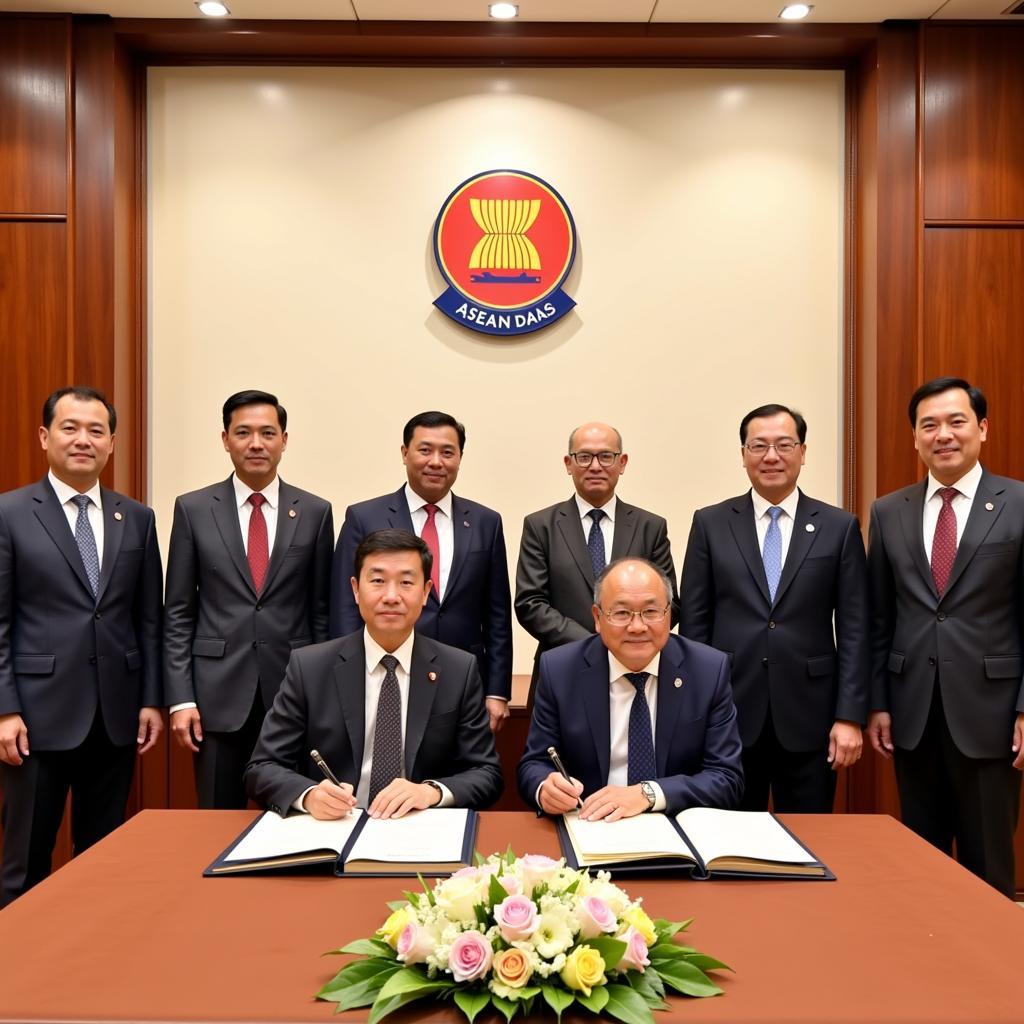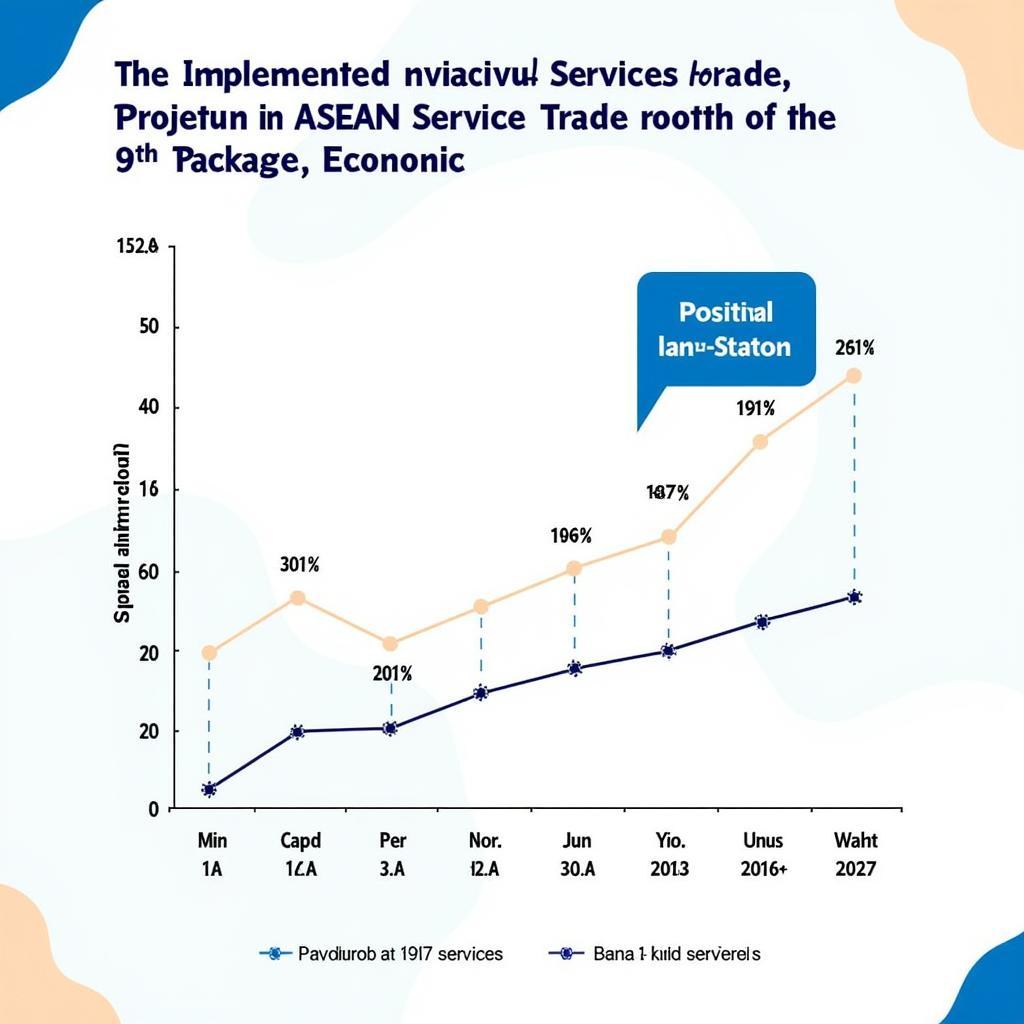The ASEAN AFAS (ASEAN Framework Agreement on Services) 9th Package represents a significant step towards deeper economic integration within the ASEAN region. This article delves into the key aspects of the 9th package, exploring its potential impact on trade in services and the broader ASEAN economic landscape.
Understanding the Importance of the ASEAN AFAS 9th Package
The ASEAN AFAS aims to liberalize trade in services across the ASEAN member states, fostering greater competition, efficiency, and consumer choice. The 9th Package, building on previous rounds of negotiations, is particularly crucial in addressing emerging trends and challenges in the services sector. This package focuses on enhancing regulatory transparency, streamlining procedures, and promoting mutual recognition of professional qualifications, ultimately facilitating greater cross-border movement of service providers.
 ASEAN officials signing the 9th Package agreement during a formal ceremony
ASEAN officials signing the 9th Package agreement during a formal ceremony
Key Sectors Targeted by the 9th Package
The 9th Package encompasses a wide range of sectors, including but not limited to:
- E-commerce: The package seeks to address the unique challenges and opportunities presented by the rapid growth of digital trade, aiming to create a more conducive environment for cross-border e-commerce within ASEAN.
- Financial Services: Further liberalization in financial services is expected to improve access to capital and promote greater financial inclusion across the region.
- Logistics Services: Streamlining logistics and transportation services will be critical for enhancing regional connectivity and reducing trade costs.
- Professional Services: The package emphasizes the importance of mutual recognition of professional qualifications, allowing professionals to offer their services more easily across borders.
- Telecommunications: Further opening up the telecommunications sector is expected to improve access to affordable and reliable communication services.
What are the Potential Benefits of the ASEAN AFAS 9th Package?
The Asean Afas 9th Package holds several potential benefits for businesses, consumers, and the broader ASEAN economy:
- Increased Trade and Investment: By reducing barriers to trade in services, the package is expected to stimulate greater cross-border investment and create new business opportunities.
- Enhanced Competitiveness: Greater competition in the services sector will drive innovation and efficiency, leading to improved quality and affordability of services.
- Job Creation: The liberalization of services is likely to create new jobs, particularly in emerging sectors like e-commerce and digital technologies.
- Improved Consumer Choice: Consumers will benefit from greater access to a wider range of services at competitive prices.
- Deeper Regional Integration: The 9th Package further strengthens ASEAN’s economic integration, contributing to the creation of a single market and production base.
 Businesses interacting in a vibrant marketplace, showcasing increased trade activity
Businesses interacting in a vibrant marketplace, showcasing increased trade activity
Addressing Challenges and Ensuring Effective Implementation
While the ASEAN AFAS 9th package offers significant potential, successful implementation will require addressing several key challenges:
- Regulatory Harmonization: Aligning regulations across diverse member states can be complex and time-consuming.
- Capacity Building: Strengthening institutional capacity and developing technical expertise is essential for effective implementation.
- Stakeholder Engagement: Ensuring close consultation and collaboration with all stakeholders, including businesses, governments, and civil society, is crucial for success.
“The 9th package represents a major leap forward in ASEAN’s journey towards economic integration. Its successful implementation will require a concerted effort from all stakeholders,” says Dr. Maria Santos, a leading economist specializing in ASEAN trade.
 Graph showing projected growth in ASEAN services trade
Graph showing projected growth in ASEAN services trade
Conclusion: Paving the Way for a More Integrated ASEAN Services Market
The ASEAN AFAS 9th package represents a crucial milestone in the ongoing effort to create a more integrated and dynamic ASEAN services market. By tackling key barriers to trade in services and promoting greater regulatory cooperation, the 9th package has the potential to unlock significant economic benefits for the region. Successful implementation will require continued collaboration and commitment from all stakeholders, ensuring that the ASEAN AFAS 9th package delivers on its promise of greater prosperity and opportunity for all.
FAQ
- What is the ASEAN AFAS?
- What does the 9th Package cover?
- How will the 9th Package benefit businesses?
- What are the key challenges in implementing the 9th Package?
- How can I learn more about the ASEAN AFAS 9th package?
- What is the timeline for implementation of the 9th Package?
- Who are the key stakeholders involved in the 9th Package?
For further information, explore related articles on our website: [link to relevant articles].
Need support? Contact us 24/7: Phone: 0369020373, Email: aseanmediadirectory@gmail.com, Address: Thon Ngoc Lien, Hiep Hoa, Bac Giang, Vietnam.